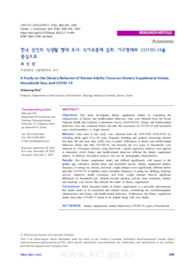

PARTNER
검증된 파트너 제휴사 자료
한국 성인의 식생활 행태 조사: 식이보충제 섭취, 가구형태와 COVID-19을 중심으로 (A Study on the Dietary Behavior of Korean Adults: Focus on Dietary Supplement Intake, Household Size, and COVID-19)
11 페이지
최초등록일 2025.05.30
최종저작일
2022.12

-
미리보기
서지정보
· 발행기관 : 대한지역사회영양학회
· 수록지 정보 : 대한지역사회영양학회지 / 27권 / 6호 / 468 ~ 478페이지
· 저자명 : 최진경
초록
Objectives: This study investigates dietary supplement intakes by examining the characteristics of dietary and health-related behaviors. Data were obtained from the Korea National Health and Nutrition Examination Survey (KNHANES). Dietary and health-related behaviors were also examined before and after the occurrence of COVID-19 and household types (multi-members vs. single person).
Methods: Data used in this study were collected from the 2019-2020 KNHANES by including adults aged 19 to 64 years. Pregnant, lactating, and subjects consuming calories less than 500 and more than 5,000 were excluded. Differences in dietary and health-related behaviors before and after COVID-19, and between the two types of households were analyzed by Chi-square analyses using Rao-Scott. Logistic regression analyses were applied to determine which dietary and health-related behaviors affected the dietary supplement intakes. In addition, descriptive analysis was run for demographic characteristics. Results: The dietary supplement intake rate differed significantly with respect to the gender, age, education, marital status, and household income. Dietary supplement intakes, frequency of eating out, obesity, and body weight changes were significantly different before and after COVID-19. In addition, meal evaluation, frequency of eating out, drinking, smoking, activity, subjective health evaluation, and body weight changes showed significant differences by household type. Attitude towards nutrition, activity, meal evaluation, obesity, and smoking were factors that affected the intake of dietary supplements.
Conclusions: While increased intake of dietary supplements is a prevalent phenomenon, this intake needs to be monitored and studied closely, considering the sociodemographic characteristics and dietary and health-related behaviors. Furthermore, the dietary supplement intake trend after COVID-19 needs to be studied along with food intake.영어초록
Objectives: This study investigates dietary supplement intakes by examining the characteristics of dietary and health-related behaviors. Data were obtained from the Korea National Health and Nutrition Examination Survey (KNHANES). Dietary and health-related behaviors were also examined before and after the occurrence of COVID-19 and household types (multi-members vs. single person).
Methods: Data used in this study were collected from the 2019-2020 KNHANES by including adults aged 19 to 64 years. Pregnant, lactating, and subjects consuming calories less than 500 and more than 5,000 were excluded. Differences in dietary and health-related behaviors before and after COVID-19, and between the two types of households were analyzed by Chi-square analyses using Rao-Scott. Logistic regression analyses were applied to determine which dietary and health-related behaviors affected the dietary supplement intakes. In addition, descriptive analysis was run for demographic characteristics. Results: The dietary supplement intake rate differed significantly with respect to the gender, age, education, marital status, and household income. Dietary supplement intakes, frequency of eating out, obesity, and body weight changes were significantly different before and after COVID-19. In addition, meal evaluation, frequency of eating out, drinking, smoking, activity, subjective health evaluation, and body weight changes showed significant differences by household type. Attitude towards nutrition, activity, meal evaluation, obesity, and smoking were factors that affected the intake of dietary supplements.
Conclusions: While increased intake of dietary supplements is a prevalent phenomenon, this intake needs to be monitored and studied closely, considering the sociodemographic characteristics and dietary and health-related behaviors. Furthermore, the dietary supplement intake trend after COVID-19 needs to be studied along with food intake.참고자료
· 없음태그
-
자주묻는질문의 답변을 확인해 주세요

꼭 알아주세요
-
자료의 정보 및 내용의 진실성에 대하여 해피캠퍼스는 보증하지 않으며, 해당 정보 및 게시물 저작권과 기타 법적 책임은 자료 등록자에게 있습니다.
자료 및 게시물 내용의 불법적 이용, 무단 전재∙배포는 금지되어 있습니다.
저작권침해, 명예훼손 등 분쟁 요소 발견 시 고객센터의 저작권침해 신고센터를 이용해 주시기 바랍니다. -
해피캠퍼스는 구매자와 판매자 모두가 만족하는 서비스가 되도록 노력하고 있으며, 아래의 4가지 자료환불 조건을 꼭 확인해주시기 바랍니다.
파일오류 중복자료 저작권 없음 설명과 실제 내용 불일치 파일의 다운로드가 제대로 되지 않거나 파일형식에 맞는 프로그램으로 정상 작동하지 않는 경우 다른 자료와 70% 이상 내용이 일치하는 경우 (중복임을 확인할 수 있는 근거 필요함) 인터넷의 다른 사이트, 연구기관, 학교, 서적 등의 자료를 도용한 경우 자료의 설명과 실제 자료의 내용이 일치하지 않는 경우
“대한지역사회영양학회지”의 다른 논문도 확인해 보세요!
문서 초안을 생성해주는 EasyAI
